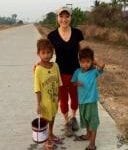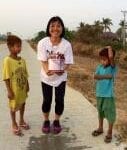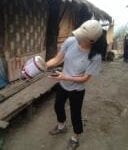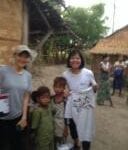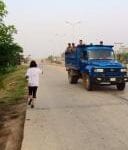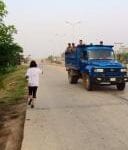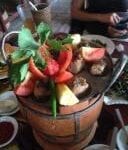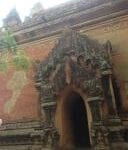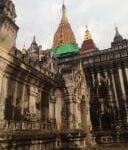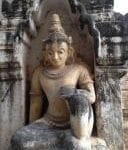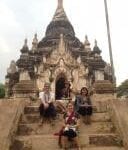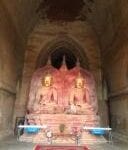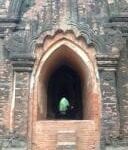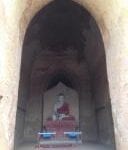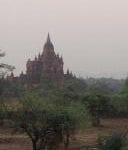Written by Thu Tran, MD,FACOG
May 3, 2014
Mylène and I woke up early this morning to run for the last time in Naypyidaw. We weren’t even tired from the late dinner last night hosted by the Myanmar Maternal and Child Welfare Association. We dined on an eight course meal with some exotic dishes like Chicken and Jelly fish salad, and Braised “Pig Hand” with Brown Sauce, similar to the soft pork I had in Chengdu, China, two years ago. I thought the Crispy Whole Chicken appetizer and the Fried Lotus Root with Bean were especially good, as good as the authentic Chinese restaurants in northern Virginia. The leaders in the MMCWA looked so elegant in their colorful longyi and beautiful jewelries. We were with the elite women of Myanmar society. They thanked us for the hard work in Myanmar, and we thanked them for their hospitality. The evening ended with many Karaoke songs from the 1970s. Who would have thought we would be singing the Bee Gee’ s songs in Myanmar? And “Sealed with a Kiss” with Bobby Vinton? I thought I was back in high school! Dr. Ko Ko Maw, the Myanmar dentist who had accompanied us on the trip, was having a time of his life singing old American songs. It was hilarious, but nostalgic, as I am no longer a teenager. I was glad I came back to the hotel after the last song, because I was getting very uncomfortable and hot underneath my longyi. I didn’t know how to wrap the longyi tightly around my waist and had to wear my long black pants underneath, just in case the longyi fell off. I wondered how the women in Myanmar could wear such longyi all day?
Mylène and I had really enjoyed our early morning runs around 5:30-6 a.m. as the roads were essentially empty. Even at 7 a.m., the new highway in front of the Amara hotel was empty most mornings. This morning, however, Mylène had a mission in mind, and she carried a bag in her hand. Inside the bag, she had several new toothbrushes from the hotel, five Rice Crispy Treat bars, a roll of duct tape, and several bars of soap
“We have to look for the boy with the leaking water can.” She said to me.
I understood immediately. I rushed back into my hotel room to gather the same items and added them to her paper bag. We had to look for that cute boy and his brother.
Yesterday, during our morning run, we had seen two little boys carrying a small water can back to their grass hut after filling it from some water source in the back of their neighborhood. There must have been a well or a small stream in that grassy area. They lived in a neighborhood behind the hotel, one full of small grass huts. The contrast between their poor neighborhood and the fancy hotels was striking. Mylène asked them for permission to take their photograph and they politely stopped and posed for us. They were so adorable.
I asked Mylène to stand in between the boys, but noticed how nervous the older one looked. He showed me how his water can was leaking, drop by drop into the ground. I took the photo quickly for Mylène. She also wanted me to have a photo with them. As the older boy looked a bit panicked, I grabbed the can from him and tried to seal the bottom with my hands as Mylène snapped the photo with my iPhone. When we had finished, the boy started running quickly with the water can, as it kept dripping water onto the sidewalk. I wondered if he had enough water to drink or to brush his teeth that morning?
Some adults were behind their huts staring at us this morning as we took off for our run.
“We have to repair his can, Thu. I couldn’t find any bucket to replace his leaking can.” Mylène said quietly. How do we find his home, she wondered?
“Maybe use your iPhone and show the adults in the neighborhood his photo?” I told Mylène. She thought it was a brilliant idea.
It was 5.30 a.m. and the sun had not risen. Another reason we loved to run at this hour was that it was not yet so hot. We always ran along the neighborhood and on the new empty highway built recently by the government.
An adult showed us where the boys lived. Mylène spotted the water can in front of his hut and, as his father was looking on, she started sealing the bottom of the can. His father went inside and woke the boys up.
After sealing the can, we gave the boys and his family the bag full of treats. We gave some of the Rice Crispy treats to his next door neighbors’ children. I gave him the “NewYork City” T shirt I had been wearing yesterday when I had met him. His parents were beaming as his dad took a photo for us. Mission accomplished.
After our usual sumptuous breakfast at the Amara Hotel, Dr. Do, Mylène and I met the regional director of USAID (U.S. Agency for International Development) for a chat about the healthcare system in Myanmar. She was kind, outspoken and smart. I could tell she was passionate about helping the people of Myanmar. She was very concerned about the healthcare access of the more than 120 ethnic groups in Myanmar. She told us how many of these groups live in the North side of the country and have minimal if any access to healthcare.
“You haven’t seen anything yet. You have only seen the tip of an iceberg! You have not seen the worse!” She told us.
As you have probably have heard from the news, there are many conflicts between the minority ethnic groups and the government with the latest one being a major conflict between the Muslims and the Buddhists. In the US, shortly before I left, I heard of the killing of 80 Muslims by Buddhists. I was shocked and saddened. Buddhists who kill? What has this world become, a temple of doom? Religion has become a big divider again!
I heard on National Public Radio how many Muslims were pushed further and further into rural areas and were unable to obtain healthcare. I heard a heart wrenching story of a husband who had to witness his wife’s slow death as she couldn’t get help. His voice broke as my heart and spirit were broken for him.
We left Amara hotel for Bagan. The bus ride was more than five hours, and we arrived to Bagan in the afternoon. We had a good lunch at a restaurant near our hotel. I had some grilled fish and a cold ginger lemon drink. The town was so quaint with a few gift shops where wood carvers were creating Buddha statues. I bought a few sand paintings depicting Myanmar monks walking the streets with their Alms bowls. I will think of some Buddhist friends to whom I will give these paintings when I come home. The artist himself was helping me pick out the paintings.
In the late afternoon, we went to see a few stunningly beautiful temples including the “Ananda Phaya.” We wandered the grounds of the temples taking pictures. The evening was peaceful as I was listening to the chanting of the monks somewhere in another temple.
That night, we went to a store of Dr. Ko Ko Maw’s friend to see “Buddha makers” in action. There are many shops in Myanmar where Buddha statues are handmade, either from stone, plaster, or even carved wood. It is an important business in Myanmar, because as many as 97% of Myanmar people are Buddhists. I came to Myanmar with two “must buy” items in my mind: two Buddha statues for my two older brothers, and a handmade puppet for myself. For 5,000 Kyat, the equivalent of $5, I bought two Buddha statues made out of plaster.
We dined in a beautiful riverfront restaurant where huge beautiful cisterns in different patterns and colors were placed along the riverfront terrace. I wished I could have brought some of them home, as I’ve always had a weak spot for pottery.
Mylène and I slept well that night. We had become roommates for the two last nights in Myanmar. For the first time on this trip, my room was free of mosquitos! Although this hotel room looked very simple compared to the Amara Hotel, I felt as if I was at the Four Season Hotel on Nevis Island in the Caribbean. It didn’t take much to please me in Myanmar, just a room without mosquitos. Everything is so relative, I told myself, as I now realized how the “stink bugs” back home were not so bad compared with the mosquitos in Myanmar. I always got annoyed at the sound of their flapping wings, but they are harmless. They are so passive that often, I picked them up with a piece of tissue paper, threw them in the toilet, and watched them do their backstrokes before flushing them down. I felt terrible killing them this way, but I have an unexplained phobia of any kind of live bug.
The mosquitos in Myanmar, unlike those on the Island of Lido in Italy, didn’t make any sound. I would wake up in the morning and see where they had landed on my arms the night before, because they left itchy red marks all over my hands and arms. They were the silent warriors of Myanmar. On the island of Lido, on the other hand, I thought the sound of the mosquitos was as dramatic as a warplane, helping me guess where they were going to land so that I could swat them with the hotel’s magazine. If God is omnipotent, I often asked myself, why are there so many mosquitos?
Tags:



